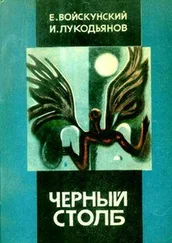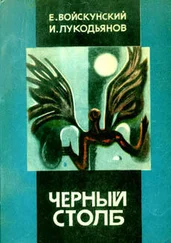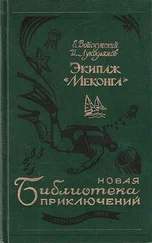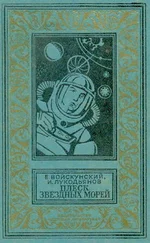Исай Лукодьянов - The Black Pillar
Здесь есть возможность читать онлайн «Исай Лукодьянов - The Black Pillar» весь текст электронной книги совершенно бесплатно (целиком полную версию без сокращений). В некоторых случаях можно слушать аудио, скачать через торрент в формате fb2 и присутствует краткое содержание. Город: Moscow, Год выпуска: 1968, Издательство: MIR Publishers, Жанр: Фантастика и фэнтези, на английском языке. Описание произведения, (предисловие) а так же отзывы посетителей доступны на портале библиотеки ЛибКат.
- Название:The Black Pillar
- Автор:
- Издательство:MIR Publishers
- Жанр:
- Год:1968
- Город:Moscow
- ISBN:нет данных
- Рейтинг книги:3 / 5. Голосов: 1
-
Избранное:Добавить в избранное
- Отзывы:
-
Ваша оценка:
- 60
- 1
- 2
- 3
- 4
- 5
The Black Pillar: краткое содержание, описание и аннотация
Предлагаем к чтению аннотацию, описание, краткое содержание или предисловие (зависит от того, что написал сам автор книги «The Black Pillar»). Если вы не нашли необходимую информацию о книге — напишите в комментариях, мы постараемся отыскать её.
© god54
The Black Pillar — читать онлайн бесплатно полную книгу (весь текст) целиком
Ниже представлен текст книги, разбитый по страницам. Система сохранения места последней прочитанной страницы, позволяет с удобством читать онлайн бесплатно книгу «The Black Pillar», без необходимости каждый раз заново искать на чём Вы остановились. Поставьте закладку, и сможете в любой момент перейти на страницу, на которой закончили чтение.
Интервал:
Закладка:
The journalists rushed to the table and each received a paper with the official communiquй.
XXII
By evening the storm had intensified, and it was pouring. A number of times fireballs sailed above the "Fukuoka Maru", as if taking observations of the ship, then went on toward the black pillar.
The unending play of lightning, the feeling of helplessness, the imminence of incomprehensible and terrible events-all made Kravtsov sick at heart. Ali-Ovsad persuaded him to come to his cabin, made tea, and questioned him about the ionosphere. Olovyannikov was there, too, watching them both.
"Listen," said Ali-Ovsad, balancing a saucer on the tips of his fingers, "The petrol engine will work, won't it? It doesn't need current."
"What about ignition?" answered Kravtsov. "How will it work without an electric spark?"
Ali-Ovsad sipped his tea thoughtfully and bit up lumps of sugar.
"I must get to Baku," he declared suddenly. "If there's no current, we've got to make a lot of kerosene." He got up, turned the switch for the lights, and the ceiling lamp lit up obediently. "It lights," said he. "The Japanese probably thought there'd be no electricity. Why does Morozov listen to him?"
"Morozov wouldn't frighten people for nothing."
"Ai balam, any man can make mistakes." Ali-Ovsad, sipping tea again from his saucer, started telling them about Novruzov, a geologist who never made mistakes. But one fine day a well that had been drilled at a spot chosen by Novruzov himself and had already reached a depth of two thousand metres, suddenly disappeared into the ground.
"When was this?" asked Olovyannikov, taking his notebook from his pocket.
"Long ago, in forty-nine. Don't write, our paper The Derrick' wrote at the time: 'Driller Ali-Ovsad standing on the derrick, saving the rotary table, winch, and pump.' I saved the table and the winch, that's true, but not the pump. It was a good pump, 'Red Hammer' works. Then we all had to run for it-the derrick itself sank into the ground. Now there's water there-a lake."
"What did the geologists say?"
"Each one spoke his piece-strata, structure… The Earth, but what's under the Earth, we don't know."
Kravtsov had listened absent-mindedly; he knew all about the stir that episode at the Shirvanneft field had caused. And he was full of tea.
"I'm going to write some letters," he said, and made off for his own cabin.
Outside Will's door, he paused for a moment thinking, then tapped softly. The door was opened immediately, and Norma Hampton stood there.
She put her finger on her lips and shook her head.
"Who's there?" asked Will's weak voice.
"Aren't you asleep?" said Norma. "Well, come in then, Mr. Kravtsov."
"Well, how are you, Will?" Kravtsov sat down, with an anxious look at the Scotsman's face. The cabin was in semi-darkness; only the bed lamp, covered with a newspaper, was burning.
"Not too bad. Switch on the light." The ceiling lamp lit up, and by its yellow light Will's dry-face looked unfamiliar to Kravtsov. Perhaps because his cheeks were covered with a grizzled bristle. There was a new expression in his eyes, too: this ironic smile had gone. Moved by a sudden tender impulse, Kravtsov gently pressed Will's arm with his hand.
"Tell us the news, laddie," said Will.
"The news? There is news, but not very good news." Kravtsov related everything they had been told.
"There won't be any electric current?" exclaimed Norma Hampton. "Did you understand Stamm correctly?"
Kravtsov smiled. "I'm telling you everything I heard, word for word. By the way, Mrs. Hampton, you did not receive your copy of the text, and I never thought of getting one for you. But there must be some left at the press centre."
"Oh, never mind about that," said Norma.
"She's not at all young, not at all," thought Kravtsov, looking at her tired face.
"Go on," Will said to her. "It's your duty."
"And it will give you a little rest," added Kravtsov. "I'll stay with Will."
"All right then." Norma rose hesitatingly. "If you'll stay here… Here's his medicine. At nine o'clock sharp give him twenty drops."
She went out.
"A short circuit," said Will after a pause. "Well now."
"Yes. A colossal clamp between the ionosphere and the Earth. It's hard to imagine."
"I was sure it was only a magnetic anomaly," said Will. "That's why I undertook to go on watch- I wanted to verify my theory. Not mine, actually. Even then, six years ago, it had been suggested by Guillard, Noiret…"
"And Komarnitsky," put in Kravtsov.
There was a knock at the door. A Japanese steward glided into the cabin, made a courteous sibilant sound, and put a candle in a black saucer on the table.
"What's that for?" asked Kravtsov.
"Captain's orders, sir."
The steward noiselessly closed the door after him.
"Candles, kerosene lamps…" Kravtsov shook his head. "What we've come to!"
"Laddie, go and tell them-an atom bomb. Only an atom bomb can smash the pillar."
"Don't, Will."
"I'm not joking. There's no other way."
They were silent for a while. Kravtsov glanced at his watch, put twenty drops of medicine into a glass of water, and gave it to the Scotsman.
"Are your parents alive?" asked Will suddenly-
"My mother is. I don't remember my father- he was killed in 1948, when I was three. He was a test-pilot."
"He crashed?"
"Yes. A jet fighter."
Will said nothing and then asked another question, as unexpected as the first. "Why are you learning Esperanto?"
"Well, simply because it's interesting." Kravtsov smiled. "I don't think it would be a bad idea if everybody learnt an international language. It would be easier to communicate."
"And you absolutely want to communicate?"
"I don't know what to say, Will. Communication between people-what's bad about that?"
"I'm not saying it's bad. It's simply useless."
"I don't want to argue with you now. Get better, and then we'll argue."
"There's something about you that irritates me."
Kravtsov looked Will straight in the "eye, and decided to turn it all into a joke: "That's probably because I've been cooking buckwheat for breakfast too often."
The ceiling lamp grew dimmer and dimmer and went out, and the table lamp as well.
"It's begun," said Kravtsov, searching in his pocket for matches. "Good-bye, electricity!"
He struck a match and lit the candle.
XXIII
It did not happen at the same time all over the planet. At first the zone of demagnetization embraced only the region round the black pillar, but slowly and unevenly it began to spread right round the Earth.
Electromagnetism held out longest on a tiny patch of land lost in the Atlantic wastes-Ascension Island, which was geographically almost at the antipodes of the black pillar. Electric lights were extinguished there eleven days later.
Life on the planet seemed to have taken a gigantic leap back to the previous century.
In vain the waters of the Volga, the Nile, and Colorado River, falling from enormous dams, turned the wheels of power stations: the rotors of the generators connected to them turned idly -their coils crossed no magnetic lines of force, and no electromotive force was imparted to them.
In vain did water continue to be heated by atomic piles: the steam turned the rotors just as pointlessly.
The close network of power transmission lines that covered the planet was useless; useless, too, were the electric wires that connected up factories, workshops, and homes; the life-giving flow of electrons no longer ran along them, bringing light, warmth, and power.
Electric current had not, of course, disappeared altogether. It was produced by chemical elements-the batteries of pocket torches, for example. It was produced by accumulator batteries- until they ran down; but there was no means of charging them. It was produced by electrostatic friction machines, by thermoelectric and solar batteries. Attempts were made to connect these to the windings of generator stators, but the current passed through them without effect and did not produce an artificial magnetic field.
Читать дальшеИнтервал:
Закладка:
Похожие книги на «The Black Pillar»
Представляем Вашему вниманию похожие книги на «The Black Pillar» списком для выбора. Мы отобрали схожую по названию и смыслу литературу в надежде предоставить читателям больше вариантов отыскать новые, интересные, ещё непрочитанные произведения.
Обсуждение, отзывы о книге «The Black Pillar» и просто собственные мнения читателей. Оставьте ваши комментарии, напишите, что Вы думаете о произведении, его смысле или главных героях. Укажите что конкретно понравилось, а что нет, и почему Вы так считаете.








